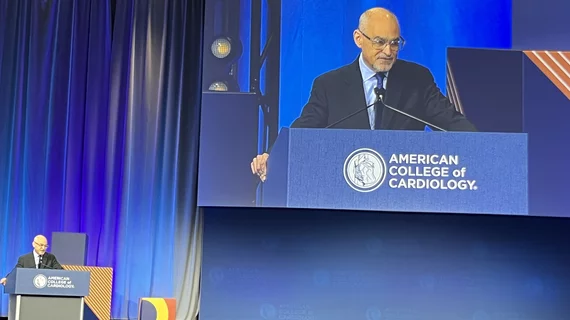Oral semaglutide reduces heart risks while helping patients move past ‘fear of the needle’
The oral version of semaglutide delivers significant cardiovascular benefits for patients with type 2 diabetes, according to a late-breaking clinical trial presented at ACC.25, the annual meeting of the American College of Cardiology.
Semaglutide is a the GLP-1 receptor agonist sold by Novo Nordisk as an injectable under the brand names Wegovy and Ozempic. While GLP-1 drugs were originally developed to treat diabetes, researchers keep finding new ways for these medications to boost patient outcomes. Semaglutide has grown especially popular in recent years, but clinical guidelines have been recommending that patients receive a subcutaneous formulation of the drug. The SOUL trial evaluated an oral formulation of semaglutide sold under the brand name Rybelsus. Rybelsus must be taken on an empty stomach at least 30 minutes before patients eat or drink anything else. It can only be washed down with a small amount of water.
Lead author Darren K. McGuire, MD, a professor of medicine at UT Southwestern Medical Center, and colleagues, examined data from more than 9,000 patients with type 2 diabetes, atherosclerotic cardiovascular disease and/or chronic kidney disease in 44 different countries. All patients were 50 years old or older. While half of patients took oral semaglutide daily, the other half only took a placebo.
Overall, McGuire et al. found that the study’s primary outcome—a composite of death from cardiovascular disease, nonfatal myocardial infarction or stroke—was seen in 12% of semaglutide patients and 13.8% of patients given a placebo. This represents a 14% overall reduction, which the group said resembled the performance clinicians have learned to expect when prescribing an injectable form of semaglutide.
The most noteworthy improvement in the semaglutide group was the 26% reduction seen in the nonfatal MI rate when compared to a placebo.
“These trial results add to the favorable benefit risk ratio of oral semaglutide in this population,” McGuire said during his presentation. “In conclusion, oral semaglutide is the first and only oral GLP-1 receptor agonist with proven cardiovascular benefits.”
McGuire did emphasize that injectable semaglutide is the “preferred route” of treatment for this drug. However, he said, patients are still consistently scared of semaglutide injections and this oral formulation represents a new opportunity for people with a “fear of the needle” to still see substantial benefits.
The SOUL findings were simultaneously published in The New England Journal of Medicine.[1] Click here to read the team’s full analysis.
A substantial sign of progress
One of the ACC.25 panelists on the stage during McGuire’s presentation was Anuradha Lala, MD, a cardiologist with the Lauder Family Cardiovascular Ambulatory Center at Mount Sinai Fuster Heart Hospital. Lala congratulated McGuire and his team on a successful trial and discussed the implications of these data.
“For the nearly 800 million individuals living worldwide with type 2 diabetes, we now have expanded options to improve outcomes, which is really thrilling,” she said. “As a heart failure cardiologist, I’m really moved by the fact that we are moving from siloed systems of care to more comprehensive, whole-body systems of care.”
Another home run for Novo Nordisk
The positive Rybelsus data represented a second positive study for Novo Nordisk’s semaglutide in one day. Just hours earlier, cardiologist Marc P. Bonaca, MD, presented data on the drug’s potential impact on patients who present with both type 2 diabetes and PAD.
“Novo Nordisk continues to evolve its focus beyond diabetes and obesity towards a broader spectrum of metabolic and cardiovascular health,” Martin Holst Lange, executive vice president for development at Novo Nordisk, said in a statement. “These data, alongside our other data being presented at ACC, reinforce the comprehensive set of health benefits of semaglutide, making it a strong option for healthcare professionals addressing the spectrum of metabolic and cardiovascular health—and our continued leadership in the space.”


